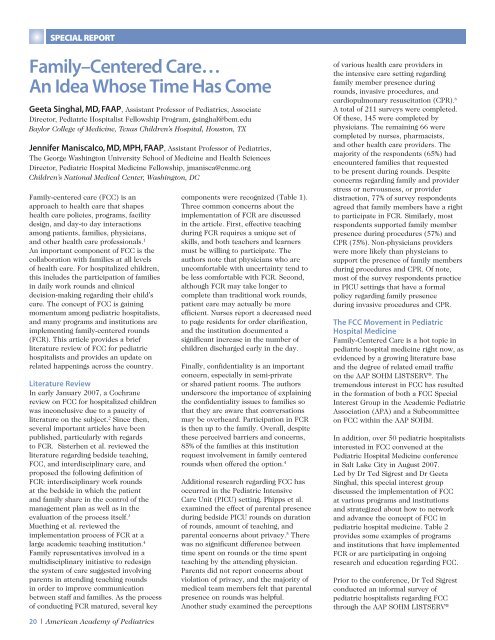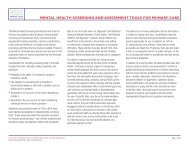Susan Wu, MD, FAAP, Editor - American Academy of Pediatrics
Susan Wu, MD, FAAP, Editor - American Academy of Pediatrics
Susan Wu, MD, FAAP, Editor - American Academy of Pediatrics
Create successful ePaper yourself
Turn your PDF publications into a flip-book with our unique Google optimized e-Paper software.
SPeCiaL rePort<br />
Family–Centered Care…<br />
An Idea Whose Time Has Come<br />
Geeta Singhal, <strong>MD</strong>, <strong>FAAP</strong>, Assistant Pr<strong>of</strong>essor <strong>of</strong> <strong>Pediatrics</strong>, Associate<br />
Director, Pediatric Hospitalist Fellowship Program, gsinghal@bcm.edu<br />
Baylor College <strong>of</strong> Medicine, Texas Children’s Hospital, Houston, TX<br />
Jennifer Maniscalco, <strong>MD</strong>, MPH, <strong>FAAP</strong>, Assistant Pr<strong>of</strong>essor <strong>of</strong> <strong>Pediatrics</strong>,<br />
The George Washington University School <strong>of</strong> Medicine and Health Sciences<br />
Director, Pediatric Hospital Medicine Fellowship, jmanisca@cnmc.org<br />
Children’s National Medical Center, Washington, DC<br />
Family-centered care (FCC) is an<br />
approach to health care that shapes<br />
health care policies, programs, facility<br />
design, and day-to day interactions<br />
among patients, families, physicians,<br />
and other health care pr<strong>of</strong>essionals. 1<br />
An important component <strong>of</strong> FCC is the<br />
collaboration with families at all levels<br />
<strong>of</strong> health care. For hospitalized children,<br />
this includes the participation <strong>of</strong> families<br />
in daily work rounds and clinical<br />
decision-making regarding their child’s<br />
care. The concept <strong>of</strong> FCC is gaining<br />
momentum among pediatric hospitalists,<br />
and many programs and institutions are<br />
implementing family-centered rounds<br />
(FCR). This article provides a brief<br />
literature review <strong>of</strong> FCC for pediatric<br />
hospitalists and provides an update on<br />
related happenings across the country.<br />
Literature Review<br />
In early January 2007, a Cochrane<br />
review on FCC for hospitalized children<br />
was inconclusive due to a paucity <strong>of</strong><br />
literature on the subject. 2 Since then,<br />
several important articles have been<br />
published, particularly with regards<br />
to FCR. Sisterhen et al. reviewed the<br />
literature regarding bedside teaching,<br />
FCC, and interdisciplinary care, and<br />
proposed the following definition <strong>of</strong><br />
FCR: interdisciplinary work rounds<br />
at the bedside in which the patient<br />
and family share in the control <strong>of</strong> the<br />
management plan as well as in the<br />
evaluation <strong>of</strong> the process itself. 3<br />
Muething et al. reviewed the<br />
implementation process <strong>of</strong> FCR at a<br />
large academic teaching institution. 4<br />
Family representatives involved in a<br />
multidisciplinary initiative to redesign<br />
the system <strong>of</strong> care suggested involving<br />
parents in attending teaching rounds<br />
in order to improve communication<br />
between staff and families. As the process<br />
<strong>of</strong> conducting FCR matured, several key<br />
20 | <strong>American</strong> <strong>Academy</strong> <strong>of</strong> <strong>Pediatrics</strong><br />
components were recognized (Table 1).<br />
Three common concerns about the<br />
implementation <strong>of</strong> FCR are discussed<br />
in the article. First, effective teaching<br />
during FCR requires a unique set <strong>of</strong><br />
skills, and both teachers and learners<br />
must be willing to participate. The<br />
authors note that physicians who are<br />
uncomfortable with uncertainty tend to<br />
be less comfortable with FCR. Second,<br />
although FCR may take longer to<br />
complete than traditional work rounds,<br />
patient care may actually be more<br />
efficient. Nurses report a decreased need<br />
to page residents for order clarification,<br />
and the institution documented a<br />
significant increase in the number <strong>of</strong><br />
children discharged early in the day.<br />
Finally, confidentiality is an important<br />
concern, especially in semi-private<br />
or shared patient rooms. The authors<br />
underscore the importance <strong>of</strong> explaining<br />
the confidentiality issues to families so<br />
that they are aware that conversations<br />
may be overheard. Participation in FCR<br />
is then up to the family. Overall, despite<br />
these perceived barriers and concerns,<br />
85% <strong>of</strong> the families at this institution<br />
request involvement in family centered<br />
rounds when <strong>of</strong>fered the option. 4<br />
Additional research regarding FCC has<br />
occurred in the Pediatric Intensive<br />
Care Unit (PICU) setting. Phipps et al.<br />
examined the effect <strong>of</strong> parental presence<br />
during bedside PICU rounds on duration<br />
<strong>of</strong> rounds, amount <strong>of</strong> teaching, and<br />
parental concerns about privacy. 5 There<br />
was no significant difference between<br />
time spent on rounds or the time spent<br />
teaching by the attending physician.<br />
Parents did not report concerns about<br />
violation <strong>of</strong> privacy, and the majority <strong>of</strong><br />
medical team members felt that parental<br />
presence on rounds was helpful.<br />
Another study examined the perceptions<br />
<strong>of</strong> various health care providers in<br />
the intensive care setting regarding<br />
family member presence during<br />
rounds, invasive procedures, and<br />
cardiopulmonary resuscitation (CPR). 6<br />
A total <strong>of</strong> 211 surveys were completed.<br />
Of these, 145 were completed by<br />
physicians. The remaining 66 were<br />
completed by nurses, pharmacists,<br />
and other health care providers. The<br />
majority <strong>of</strong> the respondents (65%) had<br />
encountered families that requested<br />
to be present during rounds. Despite<br />
concerns regarding family and provider<br />
stress or nervousness, or provider<br />
distraction, 77% <strong>of</strong> survey respondents<br />
agreed that family members have a right<br />
to participate in FCR. Similarly, most<br />
respondents supported family member<br />
presence during procedures (57%) and<br />
CPR (75%). Non-physicians providers<br />
were more likely than physicians to<br />
support the presence <strong>of</strong> family members<br />
during procedures and CPR. Of note,<br />
most <strong>of</strong> the survey respondents practice<br />
in PICU settings that have a formal<br />
policy regarding family presence<br />
during invasive procedures and CPR.<br />
The FCC Movement in Pediatric<br />
Hospital Medicine<br />
Family-Centered Care is a hot topic in<br />
pediatric hospital medicine right now, as<br />
evidenced by a growing literature base<br />
and the degree <strong>of</strong> related email traffic<br />
on the AAP SOHM LISTSERV ® . The<br />
tremendous interest in FCC has resulted<br />
in the formation <strong>of</strong> both a FCC Special<br />
Interest Group in the Academic Pediatric<br />
Association (APA) and a Subcommittee<br />
on FCC within the AAP SOHM.<br />
In addition, over 50 pediatric hospitalists<br />
interested in FCC convened at the<br />
Pediatric Hospital Medicine conference<br />
in Salt Lake City in August 2007.<br />
Led by Dr Ted Sigrest and Dr Geeta<br />
Singhal, this special interest group<br />
discussed the implementation <strong>of</strong> FCC<br />
at various programs and institutions<br />
and strategized about how to network<br />
and advance the concept <strong>of</strong> FCC in<br />
pediatric hospital medicine. Table 2<br />
provides some examples <strong>of</strong> programs<br />
and institutions that have implemented<br />
FCR or are participating in ongoing<br />
research and education regarding FCC.<br />
Prior to the conference, Dr Ted Sigrest<br />
conducted an informal survey <strong>of</strong><br />
pediatric hospitalists regarding FCC<br />
through the AAP SOHM LISTSERV ®



